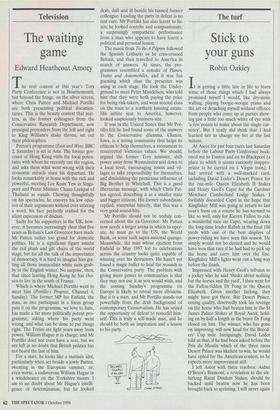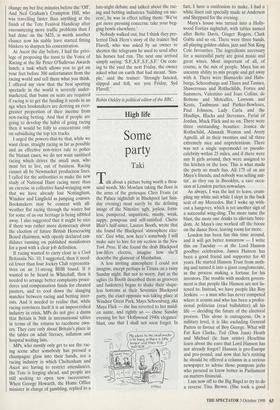The turf
Stick to your guns
Robin Oakley
It is getting a little late in life to learn some of those things which I had always promised myself I would, like dry-stone walling, playing boogie-woogie piano and the art of detaching myself without offence from people who come up at parties show- ing just a little too much white of eye with `a few points to make about the single cur- rency'. But I really did think that I had learned not to change my bet at the last minute.
At Ascot for just four races last Saturday before the Labour Party Conference beck- oned me to Euston and on to Blackpool (a place to which it seems curiously inappro- priate to be carried on a Virgin train), I had arrived with a well-marked card, including David Loder's Desert Prince for the one-mile Queen Elizabeth II Stakes and Henry Cecil's Capri for the Gardner Merchant Cumberland Lodge Stakes. I foolishly discarded Capri in the hope that Kingfisher Mill was going to return to last year's form on a course he has seemed to like so well, only for Kieren Fallon to ride a wonderful race on Capri, wearing down the long-time leader Rabah in the final 100 yards with one of the best displays of power-riding we have seen this season. He simply would not be denied and he would have won that race if he had had to pick up the horse and carry him over the line. Kingfisher Mill's lights went out a long way before the finish.
Impressed with Henry Cecil's tributes to a jockey who he said 'thinks about nothing but the horses and the yard', I then went for the Fallon-ridden Dr Fong in the Queen Elizabeth. Given another furlong, they might have got there. But Desert Prince, oozing quality, deservedly took his revenge on the horse who had beaten him in the St James Palace Stakes at Royal Ascot, hold- ing on by half a length as the brave Dr Fong closed on him. The winner, who has gone on improving, will now head for the Breed- ers' Cup mile. Intriguingly, David Loder told us that, if he had been asked before the Prix du Moulin which of the three races Desert Prince was likeliest to win, he would have opted for the American contest, so he expects more improvement still.
I left Ascot with three resolves: Aidan O'Brien's Bianconi, a revelation in the six- furlong Racal Diadem Stakes, should be backed until beaten now he has been brought back to sprinting. I will never again change my bet five minutes before the 'Off. And Neil Graham's Crumpton Hill, who was travelling faster than anything at the finish of the Tote Festival Handicap after encountering more traffic problems than I had done on the M25, is worth another chance now his stable have started fitting blinkers to sharpen his concentration.
At Ascot the day before, I had the privi- lege of proposing the toast to the Voice of Racing at the Sir Peter O'Sullevan Awards lunch, a task which allows you to get on your feet before 300 unfortunates from the racing world and tell them what you think. I offered my view that the best sporting spectacle in the world is severely under- marketed, that bums on seats are required if racing is to get the funding it needs in an age when bookmakers are deriving an ever- greater proportion of their income from non-racing betting. And that if people are going to develop the habit of going racing then it would be folly to concentrate only on subsidising the top ten tracks.
I urged the powers-that-be that, while we want clean, straight racing as far as possible and an effective non-triers rule to police the blatant cases, we do not want sanitised racing which drives the small men, who must bet to live, out of business. Racing cannot all be Newmarket production lines. I called for the authorities to make the new study of National Hunt racing more than an exercise in collective hand-wringing now that we have already lost Nottingham, Windsor and Lingfield as jumping courses. Bookmakers may be content with all- weather flat racing through the winter but for some of us our heritage is being nibbled away. I also suggested that it might be nice if there was rather more democracy about the election of future British Horseracing Board chairmen, with openly declared can- didates running on published manifestoes for a post with a clear job definition.
If racing wanted to carry clout in a Cool Britannia No. 10, I suggested, then it need- ed fewer than four Jockey Club representa- tives on an 11-strong BHB board. If it wanted to be heard in Whitehall, then it needed to arrange better complaints proce- dures and compensation funds for cheated punters, and to cool down the slanging matches between racing and betting inter- ests. And it needed to realise that, while racing convinces itself it is an impoverished industry in crisis, MPs do not give a damn that Britain is 36th in international tables in terms of the returns to racehorse own- ers. They care only about Britain's place in the tables on adult literacy, inflation and hospital waiting lists.
MPs, who mostly only get to see the rac- ing scene after somebody has pressed a champagne glass into their hands, see a racing industry in which Cheltenham and Ascot are having to restrict attendances, the Tote is forging ahead, and people are still seeking to open new racecourses. When George Howarth, the Home Office minister in charge of gambling, replied to a late-night debate and talked about the rac- ing and betting industries 'building on suc- cess', he was in effect telling them: 'We've got more pressing concerns: take your beg- ging bowls elsewhere.'
Nobody walked out, but I think they pre- ferred Dick Hem's story of the trainer Syd Flavell, who was asked by an owner to shorten the telegrams he used to send after his horses had run. The next one arrived simply saying: `S.F.,S.F.,S.F.,S.F.' On com- ing to the yard the next Friday, the owner asked what on earth that had meant. 'Sim- ple,' said the trainer: 'Strongly fancied, slipped and fell, see you Friday, Syd Flavell.'
Robin Oakley is political editor of the BBC.











































































 Previous page
Previous page